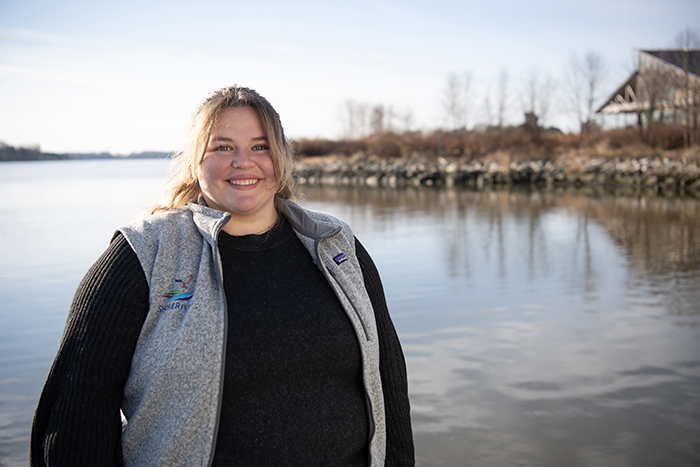A Shore Good Career
A meaningful internship leads an alum to a dream job.

The rivers and waterways are some of the most iconic and defining features of Maryland's Eastern Shore. Maintaining these vast bodies of water is no small task, but organizations like ShoreRivers and individuals like Maegan White '23 are actively leading the charge to keep the rivers and environment clean.
“This is a very unique region,” White said. “We're doing work that is directly impacting the Chester River, which will, in turn, impact the Chesapeake Bay and all the other rivers we serve.”
ShoreRivers is a nonprofit organization dedicated to maintaining four of the Eastern Shore's watersheds: the Choptank, Miles and Wye, Sassafras, and Chester. This entails everything from monitoring water quality to advocacy work to leading trash pickups.
“We're a hyperlocal organization. And because of that, you really get to know the community that you're working with, especially on the Eastern Shore because they're all small towns,” White said.
In her role as the community engagement coordinator, White's main responsibility is to oversee ShoreRivers' volunteer programs, boost member engagement, and focus on aquatic restoration efforts. Last summer, she coordinated a volunteer effort to manually remove the water chestnut, an invasive species that was initially introduced to the region as an ornamental pond decoration. These dense plants cover the surface of the water, preventing sunlight from reaching plants and animals below and having a detrimental impact on the entire ecosystem.
For White, leading efforts that are actively benefiting Maryland's waterways and connecting with the community has been the best experience within this job. Every day, she looks to engage community members and to make them feel empowered and excited about environmental stewardship.
“I think that's been one of the most meaningful aspects of the job; you know who you're working with, and you get to work very closely with them.” As an alum of Washington College, White has called the Eastern Shore home for over four years now. A very outdoorsy person on and off the clock, she spends her free time hiking and kayaking, fully immersing herself in the environment that she protects.
White served as the secretary of service and community relations in the Student Government Association at Washington College, a role that allowed her to meet and interact with different officials and organizations in town. That's how she crossed paths with ShoreRivers for the first time. Looking back on her time as a student, White was very happy to have made that particular connection then. “Two years later, I was applying for a position with them as an intern.”
Her application was accepted, and she interned with them in the summer following her junior year—an internship funded by the Washington College Center for Environment and Society. During her senior year, a similar internship with them was funded by the Holstein Program in Ethics at the Washington College Starr Center for the Study of the American Experience, allowing White to continue her work through that academic year.
Over the course of the two internships, White became fully involved in restoration efforts. She helped plant oysters in oyster reefs as part of Marylanders Grow Oysters program. This ShoreRivers program brings many organizations together, including Washington College, to help volunteers repopulate the watersheds with oyster reefs. Anyone with access to a dock on a saline waterway can receive an oyster cage and oyster spat to grow oysters. Later, volunteers from the program will “plant” the grown oysters on reefs throughout the watershed. Oysters are filter feeders and can filter as much as 50 gallons of water a day, making them essential to improving water quality in the Chesapeake Bay.
As an intern, White also testified in front of the Kent County commissioners about the Forest Conservation Act, a measure that identifies and protects forest and sensitive areas of forest in the state. It also creates a minimum mitigation fee for trees cut down for development and building. “It wasn't just busywork that you give to an intern; it was real and meaningful work.”
After falling in love with the work and the office culture at ShoreRivers, White was hired as their community engagement coordinator following her graduation from Washington College. She feels incredibly lucky to work at a job that will make a lasting and meaningful impact on the region and one where no two days of her life on the Eastern Shore are the same.
“I like having a little bit of something different to do every week. Being able to work on improving the Chesapeake Bay has been really meaningful,” White said. “It really was thanks to all of these connections and experiences at the College—from having a student leadership role to having an internship funded through the Center for Environment and Society and the Starr Center to then getting that full-time job. I'm very, very appreciative and happy with all the experiences that I had at Washington College that have led me to where I am now.”
— Tim Corrao